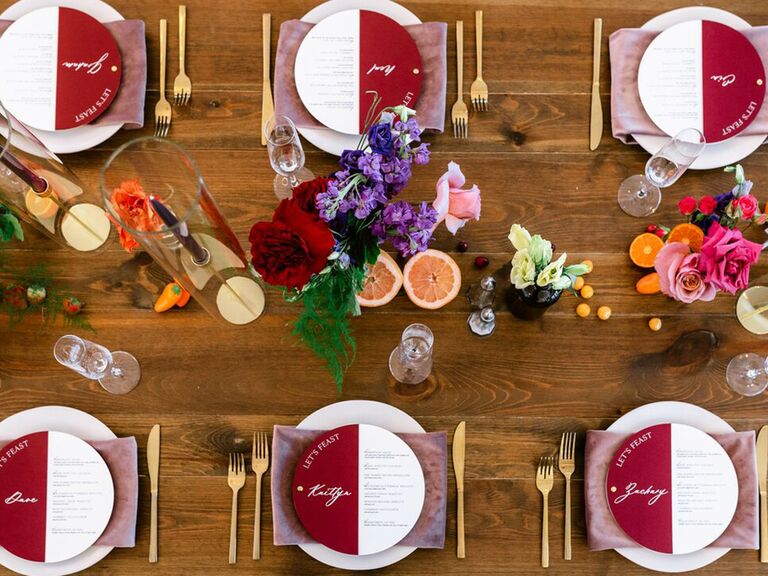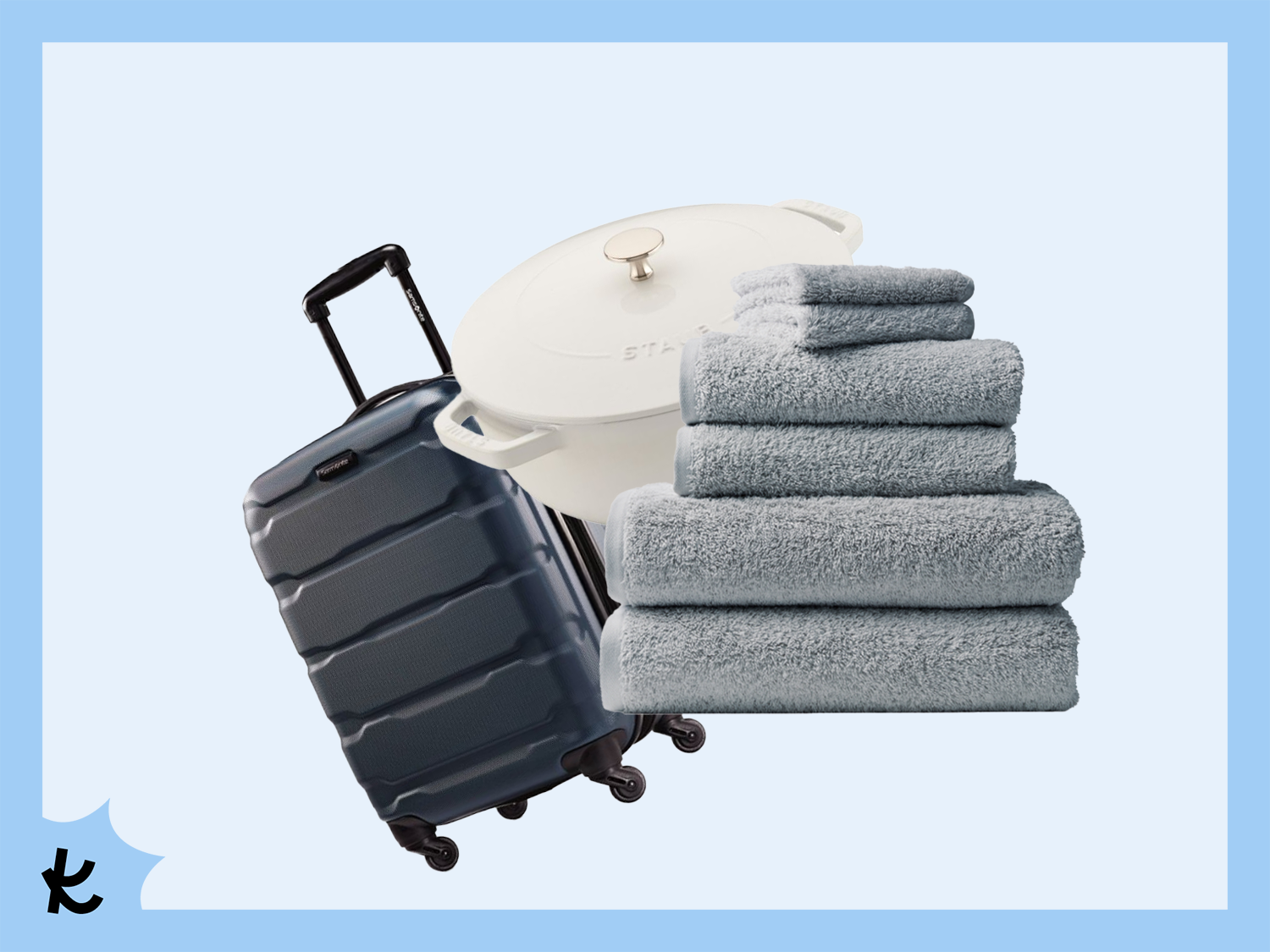Here's Our Take on the "Cover Your Plate" Wedding Gift Rule
Ever heard of the "cover your plate" rule? Basically, in some regions, it used to be considered good etiquette for guests to choose a wedding gift with a similar price tag as the cost per plate at the reception—therefore, their wedding gift spend would "cover their plate." It's a reasonable idea in theory, but here's the thing: this would naturally require guests to know how much the happy couple is paying per plate, a financial detail not everyone's comfortable sharing with a crowd. It also suggests a guest is only willing to pay as much as you're shelling out to host them. Or on the flip side, it suggests they're obligated to pay as much, even if they can't afford it, making you look inadvertently greedy. Complicated, right? Here's our take on the whole thing.
What Is the "Cover Your Plate" Rule?
In some parts of the country, it used to be protocol for guests to give a wedding present with an equal or greater value to how much the couple spent on each person's meal on the big day—hence, the phrase "cover your plate". While this may seem like a reasonable rule of thumb, it's actually incorrect for a couple to assume that they will "break even" on their wedding by enforcing a "cover your plate" policy.
Nowadays, there's really no such thing as the "cover your plate" rule. It's a never a good idea to use the price per plate as a measure for how much guests should spend on the wedding gift—you wouldn't give your best friend a less expensive gift because they were having a more casual affair. Wedding gifts technically aren't mandatory, because they're gifts. Your guests should give a present in the price range that makes sense to them and reflects their relationship with the soon-to-be-newlyweds. If they know you well and have the means, an expensive gift might suit them better and be an expression of their love for you and excitement for your new marriage. If they've just graduated school, and simply traveling to the wedding is going to set them back as it is, they can get together with friends and find something in a price range that works for them.
How Much Should a Guest Spend on a Wedding Gift?
According to our data, the average wedding guest spends $160 on a gift. However, exactly how much you should spend on a wedding gift really depends on your relationship with the couple, and a host of other factors. We typically recommend that a close friend or family member of the couple give a registry gift, cash gift or gift card that's between $100 to $200, while a more casual acquaintance might give a little less, between $75 and $175. Coworkers typically spend less than $75, but again, it depends on the guest's closeness to the couple.
It's almost important to consider the amount of money a guest has spent on a wedding in total when determining how much to spend on a gift. For example, a member of the wedding party may have already purchased gifts for showers, engagement parties and other events, and paid planning costs for other pre-wedding celebrations, not to mention attire, accessories and travel costs to and from the wedding. That said, a wedding party member might opt to spend less on a wedding gift, or split a group gift with others. If it's a destination wedding, guests may spend less on a gift since they're already shelling out for travel and accommodations. And if you're bringing a plus-one or kids, you'd want to spend more.
And in case you're curious about the whole "cover your plate" thing, the average couple spends $266 per wedding guest, though this varies widely depending on location and formality of the wedding day. Again, there is no expected or required amount guests should spend on a gift—any gift should be appreciated, no matter the monetary value.
Does the "Cover Your Plate" Rule Apply to Other Events, Like Bridal Showers?
Again, no. A typical bridal shower gift costs between $50 and $75, and guests needn't consider "covering their plate" when purchasing a gift for this occasion. The same goes for engagement gifts or other pre-wedding presents. Guests should simply buy a gift (preferably from the couple's wedding registry) that costs an amount they're comfortable spending.
Should a Couple Tell Guests How Much to Spend on a Wedding Gift?
Absolutely not. According to wedding etiquette guidelines, couples should never appear to be asking guests for gifts directly. That means avoiding including registry information on wedding invitations and other printed materials (the only exception is including registry information on bridal shower invitations, since that event is usually hosted by someone other than the couple). Couples may put links to their registry on their wedding website, but must allow their guests to choose their own gifts.
How Should a Couple Respond if a Guest Asks How Much They Should Spend on a Wedding Gift?
Are some of your guests are inquiring into your wedding cost per plate? While it may rub you the wrong way (and we don't blame you), they're likely asking in order to gift you something in the same price range. (It may not rub you the wrong way at all, but actually make you feel like you're helping guests choose the right gift.) If it gets to point where guests are taking the rule to the extreme (aka they're getting too pushy, nosy or literal), here's how to respond politely.
Looking to avoid confrontation? Try to change the subject or deflect the conversation after fielding intrusive questions from guests. Hopefully the person you're talking to gets it. For example, say something like, "Oh, it doesn't matter. Looking forward to seeing your dancing skills at the reception, though!" If they don't understand your desire to end the price point conversation, it might be time for a stronger deflection. Say something like, "Why do you ask? Are you planning a wedding?" Making them face the fact that they're asking an extremely personal question might be a good wake-up call.
If they continue asking the question and still don't back down, just answer them truthfully. You can say something like, "I'm sorry, but I don't feel comfortable answering that question." If they insist, and bring up the fact that they want to purchase a gift in the same price point as your cost per plate, you can just say something like, "I don't want to give you a number because I think you should just give whatever you're comfortable with." Tell them what matters isn't their gift (or what it costs), but that they come and celebrate your marriage.
What Should a Couple Do If a Wedding Guest Doesn't "Cover Their Plate"?
Maybe you've seen the stories on TikTok—couples dissatisfied with the value of a particular guest's gift sending said guest a bill after the event. This goes against all wedding etiquette guidance. Technically, guests are not required to give you a wedding gift (ever hear of the phrase "your presence is present enough"?), so think of any gift, at any value, a bonus. If you're not thrilled with a guest's gift, keep it to yourself, send a polite thank-you note, and move on.
























